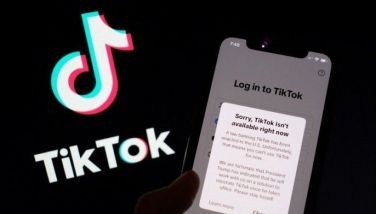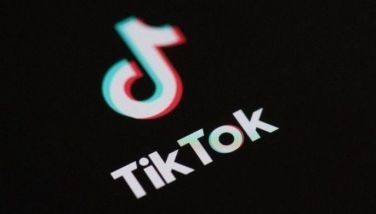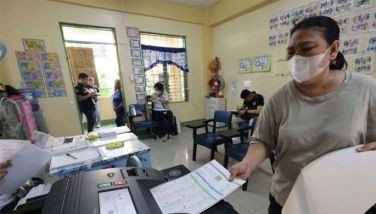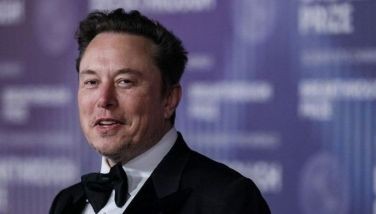Apple Phils. head sees promise in RP market
July 6, 2001 | 12:00am
 It’s a word even children not adept with English are familiar with. But the "apple" most of us Filipinos know is something we eat, not something we use to watch a movie, listen to our favorite music or play an engaging game.
It’s a word even children not adept with English are familiar with. But the "apple" most of us Filipinos know is something we eat, not something we use to watch a movie, listen to our favorite music or play an engaging game.
Such an apple is a computer.
Although known worldwide for their superior quality and innovative design, Apple computers have yet to become popular in this country. There are only a handful of people – mostly the moneyed ones – who use the Apple Macintosh or the Mac. The majority are still using so-called IBM-compatible PCs.
Mainly for this reason, the American company decided two years ago to finally set up shop here. It formed Apple Philippines which now takes care of selling and servicing Apple products. Consistent to Apple’s "Think Different" credo, however, Apple Philippines seems to be doing business in a totally different way.
Consider these:
• Apple Philippines has only four employees – a country manager in charge of overall operations; one who takes care of sales; another who minds the training of and support for customers; and a fourth who is in charge of managing dealers or resellers.
• Tasked to sell computers, Apple Philippines doesn’t keep stocks in its 100-square-meter office in posh Ayala Tower One.
• It launched its biggest product this year – the new iBook – at a McDonald’s with "cowboys" and "Indians."
Interesting company? You bet. And it prompted us to do this interview.
We chatted with Apple Philippines’ country manager Charlie Tang at the Aqua Restaurant in a building fronting his office. He recalled how he was hired by Apple from Motorola (he used to be Motorola’s country manager for two-way radios) and revealed his insights on the Apple market in the Philippines.
Excerpts from the interview:
STAR: You’re approaching your first year this August as the country manager of Apple Philippines. How are you doing so far?
Tang: It’s been exciting for one. I’ve been with the IT industry for quite some time and this is one of the few companies where you don’t get to do the traditional things as you would in any other IT company. We’ve got products that we can be proud of. We’ve got wonderful products. What we preach is what you get. We’ve got iMac which is one of the best Internet computers that you can buy. It’s truly user-friendly. Every quarter or every half a year we get newer products that set the tone for the whole IT industry. Who thought of coming out with different colors? It was Apple. Who thought of flat-panel displays? It was Apple, too. Now we have a Powerbook G4 that is made of titanium and nobody ever thought of that before. Now we have an iBook that is silvery white. All of these things make our jobs much easier. Work here is very, very exciting. You take away the norms, you take away all the standards, and that’s how working at Apple is. Our products speak for themselves.
STAR: For so long a time, Apple was sold here only by a distributor. What happened?
Tang: Right. For the longest time we had an exclusive distributor and only in 1998 was Apple Philippines set up. That was the time when we went from a single distributorship to an open distributorship. Now we have two distributors, we have appointed a number of resellers and we’re expanding our resellers from Baguio all the way down to Davao.
STAR: The Philippines is undoubtedly a "PC" market. How does Apple intend to fight here?
Tang: We pick our fights. We are definitely not into the enterprise market. There are three markets that we are good at and where we will continue to push our products. One is the consumer market – the home. Second is the creative market which has been our market since the advent of desktop publishing. The only difference between the creative market then and the creative market now is that it has expanded into a lot of vertical segments. Now we have the Web and that’s part of the creative market. Lastly, we have the education market where, unknown to many people, we hold close to 25 percent market share in the United States mainly because we have the content to be able to serve that particular market. So we pick our markets. We don’t go after markets where we didn’t have particular positions before.
STAR: How are you doing now in these three markets here?
 Tang: The creative market has always been a solid Apple market and that has been an accepted fact. As for the consumer market, with the setup of the Apple centers which we started last year, we are continuing to be successful. It’s easy to start with a small base. But the challenge is how to sustain your growth in that particular market. As for education, we are trying to catch up because we encountered some barriers in that market when our first distributor was handling that market. Now we’re trying to regain momentum and we’re quite successful.
Tang: The creative market has always been a solid Apple market and that has been an accepted fact. As for the consumer market, with the setup of the Apple centers which we started last year, we are continuing to be successful. It’s easy to start with a small base. But the challenge is how to sustain your growth in that particular market. As for education, we are trying to catch up because we encountered some barriers in that market when our first distributor was handling that market. Now we’re trying to regain momentum and we’re quite successful.
STAR: Some say that the emergence of the open-source market for software would be detrimental to Apple. What can you say to that?
Tang: When we talk of open-source, we have to define what it means first. To us open-source means being able to use a particular platform and develop your applications in that particular platform and make it easy and comfortable for you. That’s what we’ve done in Apple. I’m not particularly sure what our competitors’ plans are in this open-source market but what we have now is not vaporware. What we have now is a product that is out there and that’s ready to go, with 24-hour customer assistance available. As far as Apple is concerned, we’ve done the first steps. We’ve got Mac OS X which is one of the things we can be proud of. We’ve started shipping all our products with Mac OS X starting May 21.
STAR: Apple users in the US are known to be loyal. Is this also true to Apple users here?
Tang: Oh yeah. All over the world, there’s always a group of loyal Apple users. In this country, there’s a Mac users group. This is not a group that is in anyway associated with Apple. It is something that loyal Mac users formed on their own. There is that loyal band of Mac users wherever you go.
STAR: What makes Apple users stick with the brand?
Tang: I guess these are the people who always want to be the first to have it, who want to have the best things, the coolest things. Good quality is what makes people loyal to Apple. If you look through the years, Apple has always come to the forefront of being the technology leader, being a design leader. We were the first one to come up with a graphic accelerator. We were the first one to come up with a mouse. We were the first one to come up with a design like iMac. Now we’re even the first to come up with a Firewire in a notebook. No other vendor in the market has done that.
STAR: And you were not hit by Y2K.
Tang: What’s Y2K? (Laughs) And even viruses, I often say, what virus? Those are the things that make our users quite loyal to Apple. And we’ve never failed them. Our CEO, Steve Jobs, has never failed to come up with a surprise during Mac World. Our users are the people who just couldn’t stop talking about Apple and who would defend Apple to the end. They have been our evangelists, so to speak. And we are very thankful to them.
STAR: What’s your target for this year?
Tang: Our target is basically to get as much reseller coverage as we can. Our emphasis this year is to be able to cover the Philippines on a nationwide basis with our distributors and resellers, and to be able to train these resellers to actively and accurately sell Apple products the way they should be sold. One of our primary targets is also to beef up our service support. We already have three authorized service centers and we plan to expand them to provinces and major cities. We have already appointed two resellers in Cebu and we are certifying them right now. They are undergoing training. In Davao we’ve also selected two. We’re trying to tap service centers in Cagayan de Oro, Bacolod, Baguio and the major places between Baguio and Manila.
STAR: Is it hard to become an Apple reseller?
Tang: No, not really because we already have our distributor, the one who really takes care of stocking and inventory. The only investment they should be considering to become an Apple reseller is getting a dedicated person to sell Apple, a trained person. But we would be providing them the training. We hope to be able to have more Apple centers in major shopping centers. These are retail shops dedicated to selling Apple products, accessories, software. We have one in Megamall and another one in Alabang Town Center. We’d like to have at least two more before the end of the year.
STAR: Do you have any idea how many Apple users are there in the Philippines now?
Tang: There’s been no formal study done on that yet. Even on our part, we’re trying to get as much information but there’s simply no concrete information at the moment. But we are trying to work on that. The most we’ve gotten is IDC market share data but it doesn’t tell you how many particular users there are in this country. There are some Mac users who have more than one Mac. So there’s already inaccuracy in that. As you know, Mac users usually keep vintage Macs in their homes as a museum piece. Some are even keeping an Apple II up to this day.
STAR: It seems that Apple software is not being hit by piracy.
Tang: I think there are pirated copies of Apple applications. It’s just that you have to source them out. I cannot completely say that there is no pirated Apple software out there. Probably much, much, much less than those in the Windows platform. I don’t know. Do you think we should promote that? (Laughs)
BrandSpace Articles
<
>
- Latest
Latest
Latest
January 19, 2025 - 12:39pm
By Alex Pigman | January 19, 2025 - 12:39pm
January 19, 2025 - 10:05am
By Alex Pigman | January 19, 2025 - 10:05am
January 6, 2025 - 11:05pm
January 6, 2025 - 11:05pm
December 1, 2024 - 3:59pm
December 1, 2024 - 3:59pm
Recommended

























